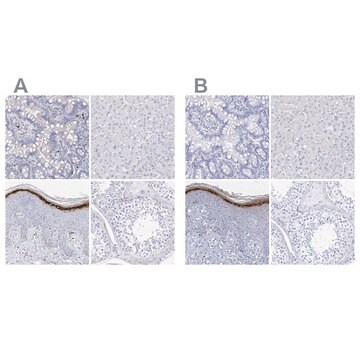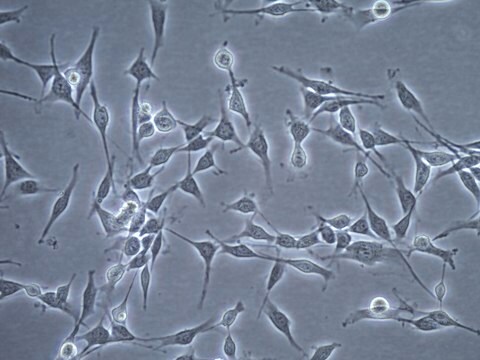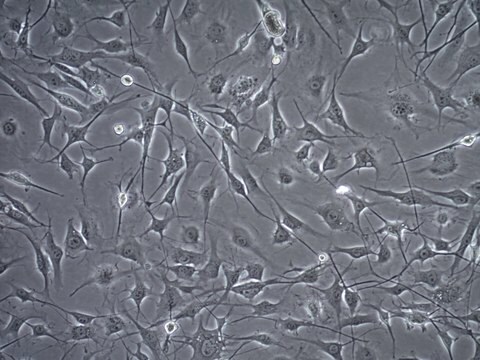SCC455
OSUMMER.11 Mouse NRAS-Mutant Melanoma Cell Line
Sign Into View Organizational & Contract Pricing
Select a Size
All Photos(6)
Select a Size
Change View
About This Item
UNSPSC Code:
41106514
NACRES:
NA.81
Recommended Products
packaging
vial of ≥1X10⁶ cells/vial mg
Quality Level
manufacturer/tradename
Millipore
growth mode
N/A
technique(s)
cell analysis: suitable
shipped in
liquid nitrogen
storage temp.
−196°C
Application
Each vial contains 1X106 viable cells.
Cells are tested negative for infectious diseases by a Mouse Essential CLEAR Panel by Charles River Animal Diagnostic Services.
Cells are verified to be of mouse origin and negative for inter-species contamination from rat, human, chinese hamster, Golden Syrian hamster, and Non-human Primate (NHP) as assessed by a Contamination Clear panel by Charles River Animal Diagnostic Services
Cells are negative for mycoplasma contamination.
Cells are tested negative for infectious diseases by a Mouse Essential CLEAR Panel by Charles River Animal Diagnostic Services.
Cells are verified to be of mouse origin and negative for inter-species contamination from rat, human, chinese hamster, Golden Syrian hamster, and Non-human Primate (NHP) as assessed by a Contamination Clear panel by Charles River Animal Diagnostic Services
Cells are negative for mycoplasma contamination.
Early-stage melanoma can be cured by resection, but fewer treatment options are available for patients with metastatic disease. Development of resistance to targeted and immunotherapies, as well as toxicity are major problems. Along with sun exposure, sporadic genetic mutations have been associated with melanomas (1). Immunotherapy treatments targeting these genes or pathways have been proven to have significant benefits in melanoma patients by improving general response and survival.
The OSUMMER (Ohio State University and Moffitt Melanoma Exposed to Radiation) cell lines fill a previously unfilled gap in melanoma biology. The OSUMMER cell lines are syngeneic to C57BL/6 laboratory mice and have genetic profiles that are similar to human tumors, making them responsive to immunotherapy treatments. These NRAS-Mutant cell lines can be used to discover and address potential immunotherapies in NRAS-mutant human melanomas which make up an estimated 15-25% of human melanomas. These cell lines also enable in vivo testing of immunotherapies with a mouse model.
OSUMMER.11 mouse NRAS-mutant melanoma cell line was derived from a female TN mouse exposed to UVA and UVB radiation. OSUMMER.11 carries the specific NRAS mutation Q61R and can form tumors in vivo without Matrigel injection. WES revealed high SNV (Single Nucleotide variants) and low CNA (Copy Number Alterations) burden, as well as the presence of UV signature mutations. OSUMMER.11 cells express the melanoma markers PMEL and MelanA and exhibit robust growth in culture.
Source
OSUMMER.11 was derived from melanoma induced in TN (Tyr::CreER) mice exposed to UVA or UVB radiation on postnatal day 3 (2).
References
1. Lancet 2018, 392(10151): 971-984.
2. Life Sci Alliance 2021, 4(9): e202101135.
The OSUMMER (Ohio State University and Moffitt Melanoma Exposed to Radiation) cell lines fill a previously unfilled gap in melanoma biology. The OSUMMER cell lines are syngeneic to C57BL/6 laboratory mice and have genetic profiles that are similar to human tumors, making them responsive to immunotherapy treatments. These NRAS-Mutant cell lines can be used to discover and address potential immunotherapies in NRAS-mutant human melanomas which make up an estimated 15-25% of human melanomas. These cell lines also enable in vivo testing of immunotherapies with a mouse model.
OSUMMER.11 mouse NRAS-mutant melanoma cell line was derived from a female TN mouse exposed to UVA and UVB radiation. OSUMMER.11 carries the specific NRAS mutation Q61R and can form tumors in vivo without Matrigel injection. WES revealed high SNV (Single Nucleotide variants) and low CNA (Copy Number Alterations) burden, as well as the presence of UV signature mutations. OSUMMER.11 cells express the melanoma markers PMEL and MelanA and exhibit robust growth in culture.
Source
OSUMMER.11 was derived from melanoma induced in TN (Tyr::CreER) mice exposed to UVA or UVB radiation on postnatal day 3 (2).
References
1. Lancet 2018, 392(10151): 971-984.
2. Life Sci Alliance 2021, 4(9): e202101135.
Features and Benefits
The OSUMMER.11 cell line carries the specific NRAS mutation Q61R and may be used to create syngeneic mouse melanoma models.
Storage and Stability
The cells should be stored in liquid nitrogen. The cells can be cultured for at least 10 passages after initial thawing without significantly affecting the cell marker expression and functionality.
Other Notes
This product is intended for sale and sold solely to academic institutions for internal academic research use per the terms of the “Academic Use Agreement” as detailed in the product documentation. For information regarding any other use, please contact licensing@emdmillipore.com.
Disclaimer
Unless otherwise stated in our catalog or other company documentation accompanying the product(s), our products are intended for research use only and are not to be used for any other purpose, which includes but is not limited to, unauthorized commercial uses, in vitro diagnostic uses, ex vivo or in vivo therapeutic uses or any type of consumption or application to humans or animals.
related product
Product No.
Description
Pricing
Storage Class
10 - Combustible liquids
wgk_germany
WGK 2
flash_point_f
Not applicable
flash_point_c
Not applicable
Certificates of Analysis (COA)
Search for Certificates of Analysis (COA) by entering the products Lot/Batch Number. Lot and Batch Numbers can be found on a product’s label following the words ‘Lot’ or ‘Batch’.
Already Own This Product?
Find documentation for the products that you have recently purchased in the Document Library.
Our team of scientists has experience in all areas of research including Life Science, Material Science, Chemical Synthesis, Chromatography, Analytical and many others.
Contact Technical Service








